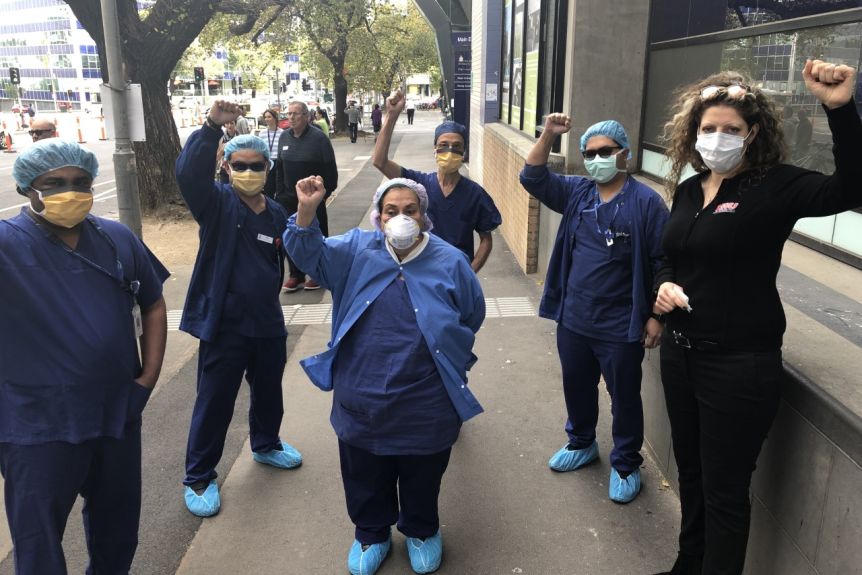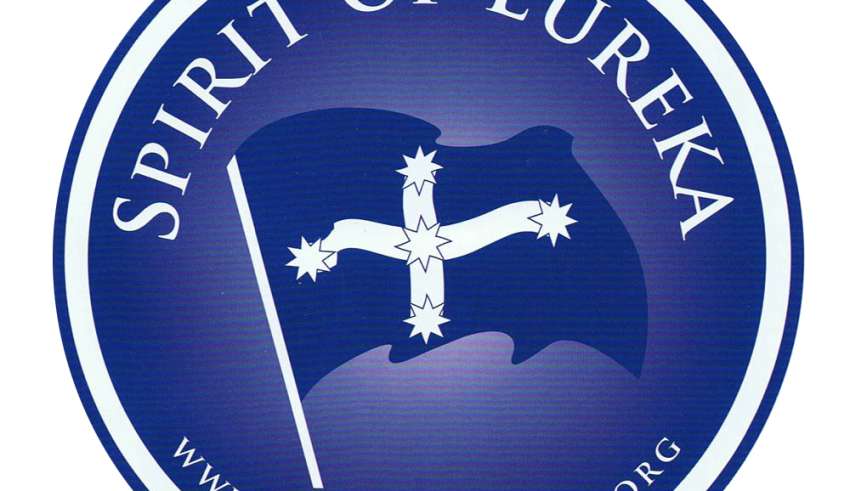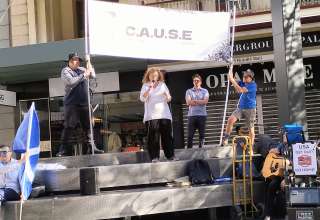Spirit of Eureka Statement, August 24, 2020
 COVID-19: Profit system has failed the people
COVID-19: Profit system has failed the people
The Covid-19 pandemic has exposed the economic and social system built on exploitation, privatisation, casualisation, insecure work and class injustices in our society. It has laid bare the deadly consequences of a system that exploits and profits from the caring of our elderly, while providing inadequate funding for our public health system and decent public housing. It is a class system that depends on these economic and social inequalities which enable the 1% super rich to live in luxury while the majority of people of the world struggle to survive.
Precarious employment, casualisation and low paid workers
Millions of casual, low paid workers in essential industries, the abattoirs, meatworks, warehouses, aged care facilities and security services, without sick leave entitlements, job security and health and safety protection are carrying the brunt of the spread of Covid-19 and its consequences. Front line health workers risk their health and lives.
And still the corporate class of big business demands more casualisation and outsourcing, more workplace “flexibility” for employers to exploit workers for profit, suppress wages and conditions, want more cuts to corporate tax and to environmental safeguards, and make working people pay for the economic and health crises.
Casualised and precariously employed workers have already been hit hard by the COVID-19 pandemic, often with little choice but to work if they are unwell to pay the rent, buy food and necessities for families. Many are also unable to work from home. Yet there are designs to further entrench a compliant and precariously employed workforce.
The COVID-19 pandemic is being used as a cover to extend attacks on the hard won conditions of workers. Preparations are being made to expand the repressive anti-union laws designed to crush organised workers fighting for their wages, conditions and democratic rights. Employer organisations such as the Business Council of Australia, the Australian Industry Group and the Minerals Council of Australia are arguing for the need to reform Australia’s Industrial Relations legislation, for industrial flexibility to deal with the current economic crisis. However, calls for increased “flexibility” are always a euphemism for threats to the conditions of workers. Employers are seeking to reduce the protections available to workers through the Award and EBA systems.
 In NSW, the state government is seeking to introduce a wage freeze for public sector workers. The NSW Department of Education is also preparing for an attack on permanency in teaching though the introduction of contracts for principals. There is not doubt that if they succeed with principals, that all teachers will face the reality of precarious employment.
In NSW, the state government is seeking to introduce a wage freeze for public sector workers. The NSW Department of Education is also preparing for an attack on permanency in teaching though the introduction of contracts for principals. There is not doubt that if they succeed with principals, that all teachers will face the reality of precarious employment.
These attacks on workers’ conditions and wages aim to make working people pay for the costs of recovery from the economic system already in crisis and worsened by the COVID-19 pandemic. At the same time the government is bailing out corporations and their profits with people’s taxes. Wage cuts have already been negotiated in several industries or workplaces, under the excuse of saving jobs.
Under the cover of repairing the economy from Covid-19, regulations and controls on environmental plunder, mining exploitation on indigenous lands and coal mining are swiftly removed to bolster profits of mining corporations.
Democratic rights eroded
Democratic and human rights organisations around the world are warning that the COVID-19 pandemic restrictions are being used to increase state powers to curtail human and democratic rights.
Since 2001, more than 83 new sweeping Federal and State repressive anti-terror laws have led to incremental erosion of hard won democratic rights in Australia. The pandemic has opened the gates to new extraordinary state powers for surveillance and policing of ordinary people during the pandemic. Police have been militarised and given new extensive powers. The Australian Defence Forces have been empowered with new far reaching military powers and funding to use for social and civil intervention and control.
Under the cover of COVID-19 these new extended state powers are unlikely to be removed after the pandemic. They will continue to be used to suppress political dissent, protests against the environmental degradation, workers’ rights and against wars. Moves are underway to give government intelligence agencies and police even more surveillance powers, whilst the main opposition ALP approves.
How greed allowed COVID-19 to thrive
In January 2020 a nasty novel coronavirus, COVID-19 began to insidiously affect the lives of Australians.
From the moment the first case was diagnosed in Victoria on January 19th, 2020, it became apparent how highly virulent this particular virus was. It had the additional ability to spread via asymptomatic transmission, and as it continued to show its strengths, VERY belatedly an economic and physical lockdown was announced in late March. Even then, it was a tempered lockdown compared to many other countries.
Despite initial success in suppression of the virus, it took hold due to Federal government failings in quarantine (Ruby Princess, initial non-existent airport monitoring), and full-on outbreaks emanating from hotel quarantine as well as a failure to have a strategy to protect the aged and susceptible workplaces (e.g. meat-works).
Our leaders decided against an elimination strategy, as the economy was short-sightedly given greater value than lives. The two are of course entwined.
Hotspots emerged from inadequate hotel quarantine, where private security companies were engaged by state governments in an unsuccessful attempt to ensure the health of Australians. Unfortunately, genomic sequencing has shown that Victoria’s so-called “second-wave” emerged from these hotels.
The shortfalls in the security industry are well-known. A lack of accountability of major companies has been evidenced in reports out of Australia’s inhumane off-shore detention regime.
Untrained, low paid, exploited casual workers are regularly subcontracted to these companies.
Indeed, the results of an inquiry commenced in 2018 were released in July. Sham contracts, and inadequate training were found to be widespread. But recommendations of the inquiry into sham contracting and casualisation have not been acted on.
Public Housing run down and neglected
The notorious outbreaks in high rise public housing, neglected by successive state and federal governments, were highly predictable. Here, people live in poverty and overcrowded third world conditions.
There has been chronic underfunding of public housing for decades in Australia. State owned properties have been sold for profit, with no adequate replacement. Again, there was an inquiry into the Public Housing Renewal Program created in June 2018 with no resulting action.
Which brings us to Aged Care.
Aged Care – lack of staff, lack of training, but no lack of profits
For years, private companies supported by state and federal governments have underfunded this vital sector in pursuit of higher profits. Now this neglect has come home to roost.
Despite clear evidence of the vulnerability of the aged in understaffed private Aged Care facilities there has been ZERO effective planning to protect them from COVID-19.
These are people who have contributed greatly to the society and deserve the best of care. But the chase for profits by private organisations has led to inadequate care due shortages of trained staff, with poor ratios of staff to residents. Profiteering and cutting corners in health and safety has led to hundreds of our elderly residents infected and dying alone.
And the staff who care for the elderly are also falling ill with this virus, as inadequate training, a lack of personal protective equipment, and insecure work across numerous workplaces puts their health and safety at risk.
This situation is repeated in abattoirs, meatworks and warehouses where profits override workers’ job security, decent wages and safe working conditions. Numerous breaches in health and safety are endemic in these industries with minimum government controls.
All of these failures share commonalities. Unfettered capitalism has been given free rein in Australia.
Nowhere more currently evident than in the aged care, security industries and abattoirs and meatworks, where workers work across several sites, many compelled to work 2-3 jobs to make a living. This gave the virus free rein. These workers cannot work from home.
Health and Safety side-lined again
And equally important, the health and safety of the workers themselves, their families, and the broader community have been severely compromised, as Health and Safety have been side-lined in the quest for never ending profits.
And yet another sweet spot is likely to emerge, as it did in Singapore, where the virus took hold amongst low-paid migrant workers living in over-crowded conditions, then spread to the general community.
Similarly, in Australia, migrants on temporary visas and international students work and live in over-crowded conditions and none are entitled to the governmental financial assistance.
Between 1904 and 1996 Victorian state government operated a 720 bed infectious diseases public hospital in Fairfield. The Fairfield Public Infectious Diseases Hospital was dedicated to the treatment of infectious diseases and internationally renowned for its research into infectious diseases. In 1996 during the massive privatisation and shut down of many public instrumentalities and services in Victoria, the hospital was closed down. It was the last infectious diseases dedicated hospital in Australia.
The government owned Commonwealth Serum Laboratories established in 1916 was renowned for its cutting edge development and manufacture of vaccines in Australia. In 1994 the CSL was privatised and corporatized. The headquarters moved to USA and manufacturing of vaccines and other medicines to Europe and USA.
COVID-19, Capitalism and Inequality
The ‘wealthiest’ country in the world (measured by GDP, which of course does not take distribution of wealth into account), the USA, is the country with one of the highest numbers and rate of COVID-19 infections and deaths. This is not surprising, given the lack of any public health system, lack of preparedness, levels of homelessness, lack of availability of adequate social services etc.
The US also has the world’s most extreme levels of inequality of income and living standards. The global rise in inequality over the past few decades is also very apparent in Australia, where the US model of extreme exploitative capitalism, disguised in main-stream media discourse as ‘liberal democracy’ and ‘freedom’, is slavishly followed.
Spread of COVID-19 from the privileged to the exploited
In the early days of the COVID-19 pandemic, wealthy, privileged, people and countries were the first to succumb to the virus. For example, high level Government officials in the US, Australia and the British Prime Minister and Royalty, contracted the virus. The first countries after China to report large numbers of cases were European. In Australia we began hearing of people returning from expensive European skiing holidays and recklessly spreading the virus and of course the Ruby Princess debacle was not caused by poverty and deprivation.
This is a manifestation of a system based on and encouraging inequality and a value system promoting individualism – ‘individual rights’ and striving for status. The super-rich are understandably (given the accolades and privileges they are given) endowed with an exaggerated sense of entitlement, with a very under-developed sense of collective social responsibility and concern for others, often exploited by them. It’s not surprising that those with the most power and privilege were the first to flaunt rules and to continue their privileged life-styles, a formula for spread of virus infection.
In the mean-time, those with less rights and less access to resources, such as casualised, immigrant and low paid workers, such as early childhood educators, the unemployed, low paid casual workers, homeless etc. are the next in line to be infected, as a result of being disempowered and exploited by the same system that privileges the rich and powerful.
Brazilian journalist Leonardo Sakamoto notes that the first known case in Brazil was a wealthy woman who returned infected from Italy and did not tell the domestic worker whom she employed on a daily basis of her infected status. He reflects: “Ingrained inequality makes it difficult for people to see themselves and others as equals and deserving the same consideration. It creates the perception (and probably the reality) that the State exists to serve the most affluent and control the poorest” (New Internationalist, July/August 2020, p. 63)
A community perspective
A society divided by inequality in distribution of wealth and power is likely to lack sufficient sense of a cohesive community to effectively deal with on-going extreme adversity. While Australians laud community responses to natural disasters such as bush fires etc., a disaster such as the pandemic, which creates on-going extreme health and economic crises, brings to the fore deep divisions in society.
Some nations that have done well in controlling spread of the virus are in East Asia, ironically close to or bordering the first epi-centre of the pandemic. Examples are Vietnam, Mongolia, Taiwan; also New Zealand, Fiji and some others. We should also include Australian First Nations communities of the Northern Territory, who, of their own volition and in spite of chronic housing shortages and other deprivations, closed borders early, inspiring the rest of the Northern Territory to do the same and avoid COVID infection (The Northern Territory has had the lowest infection rate in Australia.) A likely factor in these examples is people feeling a commitment to community above a (deliberately) exaggerated belief in individual rights.
Make the system serve the people!
Here we have had decades of a neo-liberal agenda valuing profits at all costs, over the welfare and well-being of our workers, citizens, and non-citizens.
The system works for big business. “Companies are using millions of dollars in the JobKeeper payments designed to keep workers employed during COVID-19 to help pay increased dividends to shareholders.” The Guardian 11 August 2020. https://www.theguardian.com/australia-news/2020/aug/11/companies-using-millions-in-jobkeeper-payments-to-pay-increased-dividends-to-shareholders.
At the same time the government has announced tax cuts for the wealthy few, to supposedly help the country out of the recession!
Outsourcing, profitisation, the Gig economy, and casualisation of the workforce have failed Australians. Covid-19 has blown wide open the tragic devastation corporatisation and privatisation has inflicted.
This is in stark contrast to the solidarity and mobilisation by ordinary people taking matters into their own hands, initiating collective action to mitigate the spread of the virus and build mutual support networks widely in their communities.
It shows the huge potential of what could be achieved by giving power to ordinary people to educate, organise, mobilise and make decisions in their communities and workplaces, not only during these emergency crises but during normal times. It is the collective power of ordinary people in a participatory democracy.
The COVID-19 pandemic has amplified Australia’s dangerous dependency on importation of medicines, PPEs and medical equipment from multinational corporations overseas. The urgency to establish Australia’s sovereign publicly owned and well-funded research and manufacturing industries and production has been brought home to everyone. Never again should we be left as unprepared for an emergency as were state and federal governments in the case of this pandemic.
We know that there is a National Medical Stockpile but not its location or inventory. Clearly it lacked supplies. Its day-to-day management was outsourced in 2014. It has neither been confirmed nor denied that the two plane-loads of PPE purchased by the Chinese in February, weighing more than 170 tonnes, came from the Stockpile. But its out-sourced management cannot be called to answer because it is protected under “national security” guidelines. We must encourage demands for a National Emergency Stockpile (bushfire and floods to be included) to be completely owned and operated by the federal government and publicly accountable through annual reports to parliament.
We call on the government to re-direct $billions of public funds away from the acquisition of weapons supporting and involving Australia in US wars, to be invested instead in publicly owned medical research and manufacturing, and to properly fund our public health system.
There’s a Chinese character that represents both crisis and opportunity. We can only hope the pandemic might present an opportunity to turn around the endemic and increasing inequity that characterises and dominates our capitalist world. Sounds like revolution?





